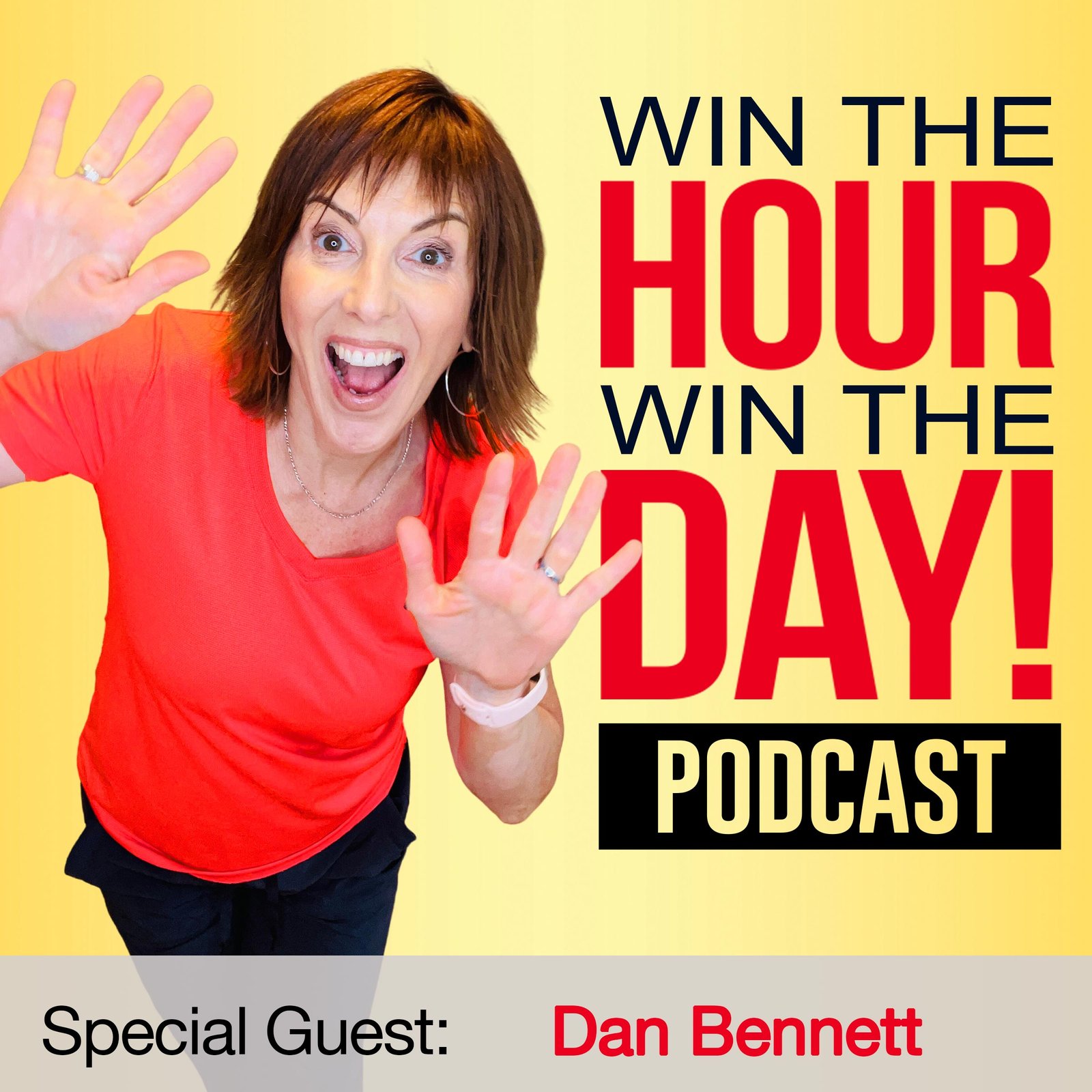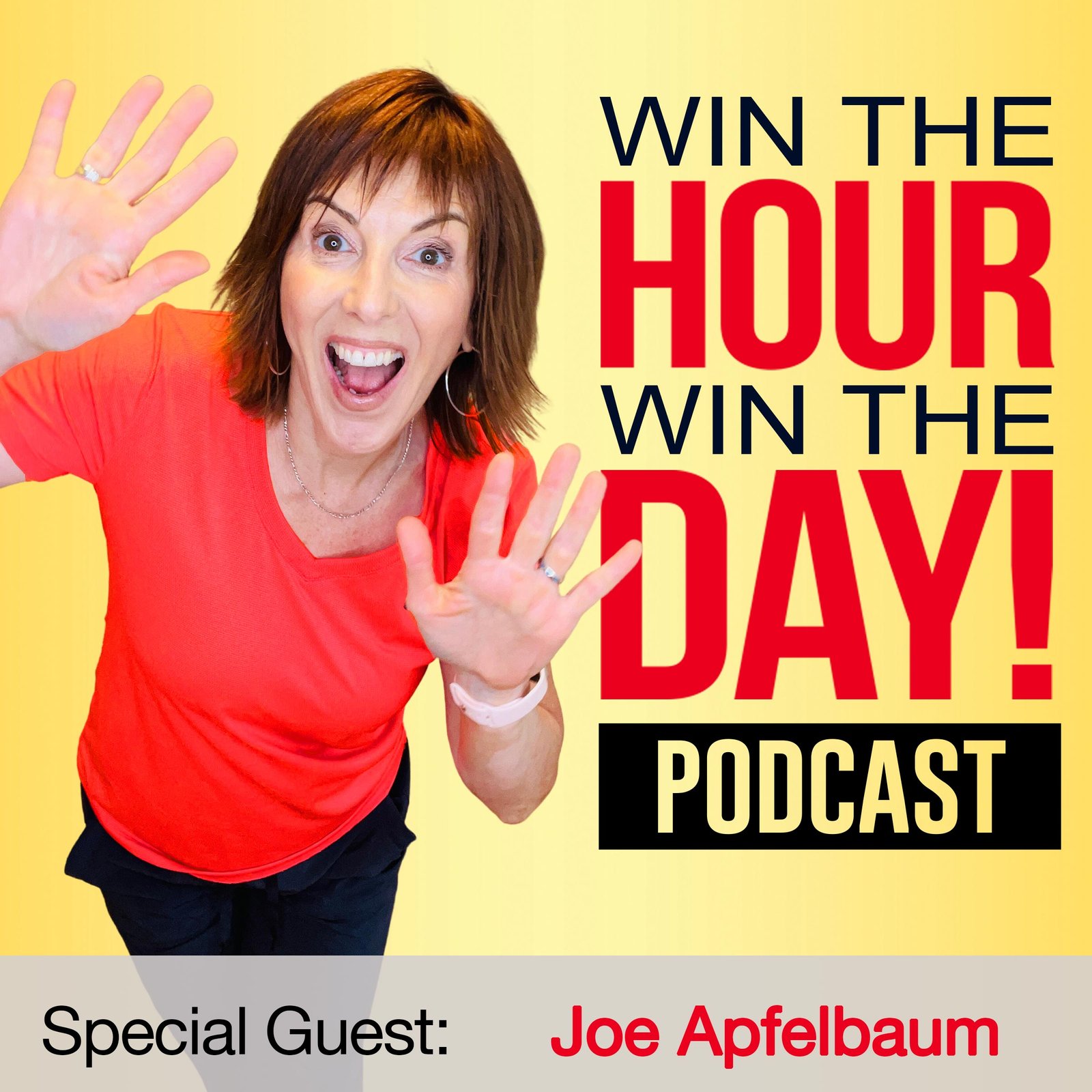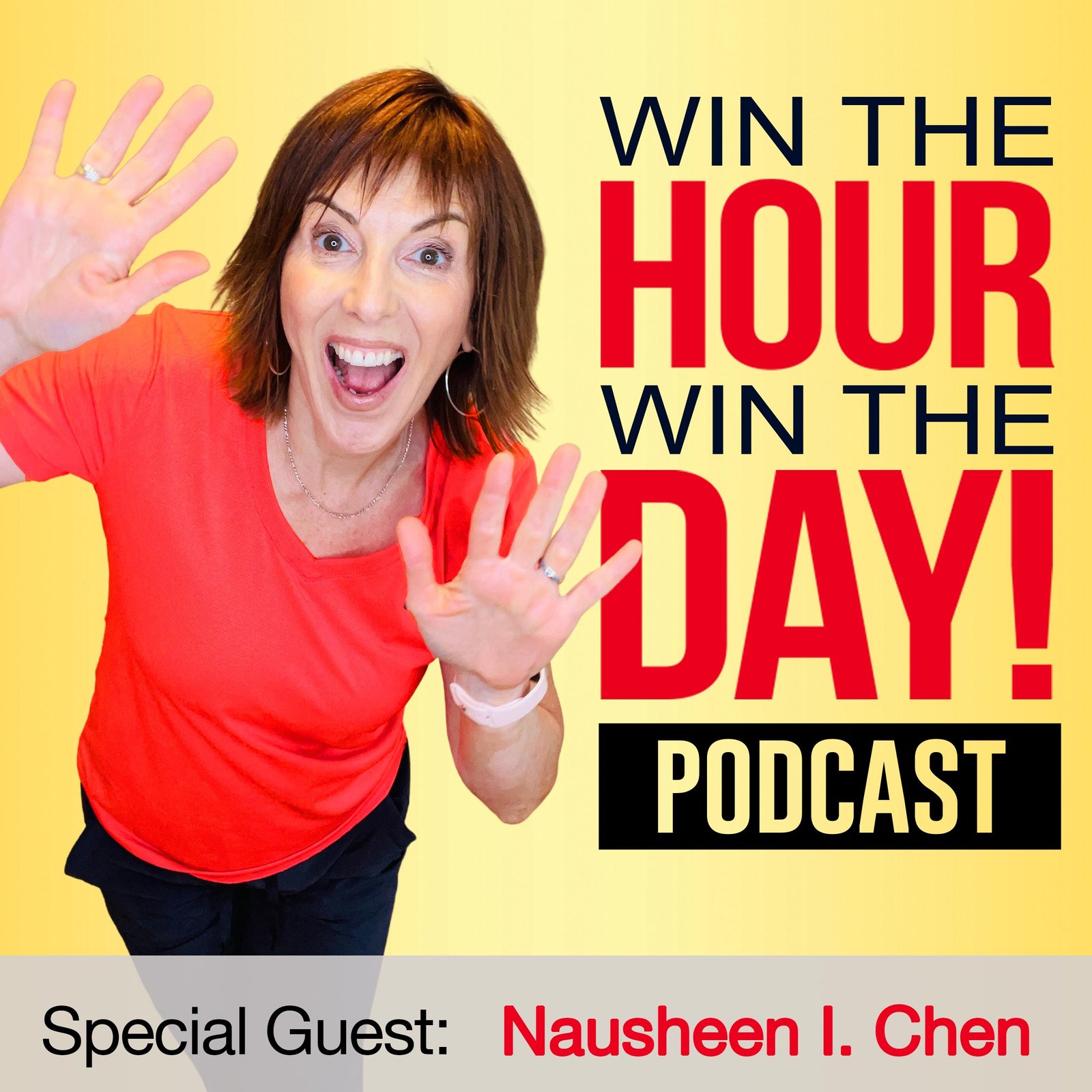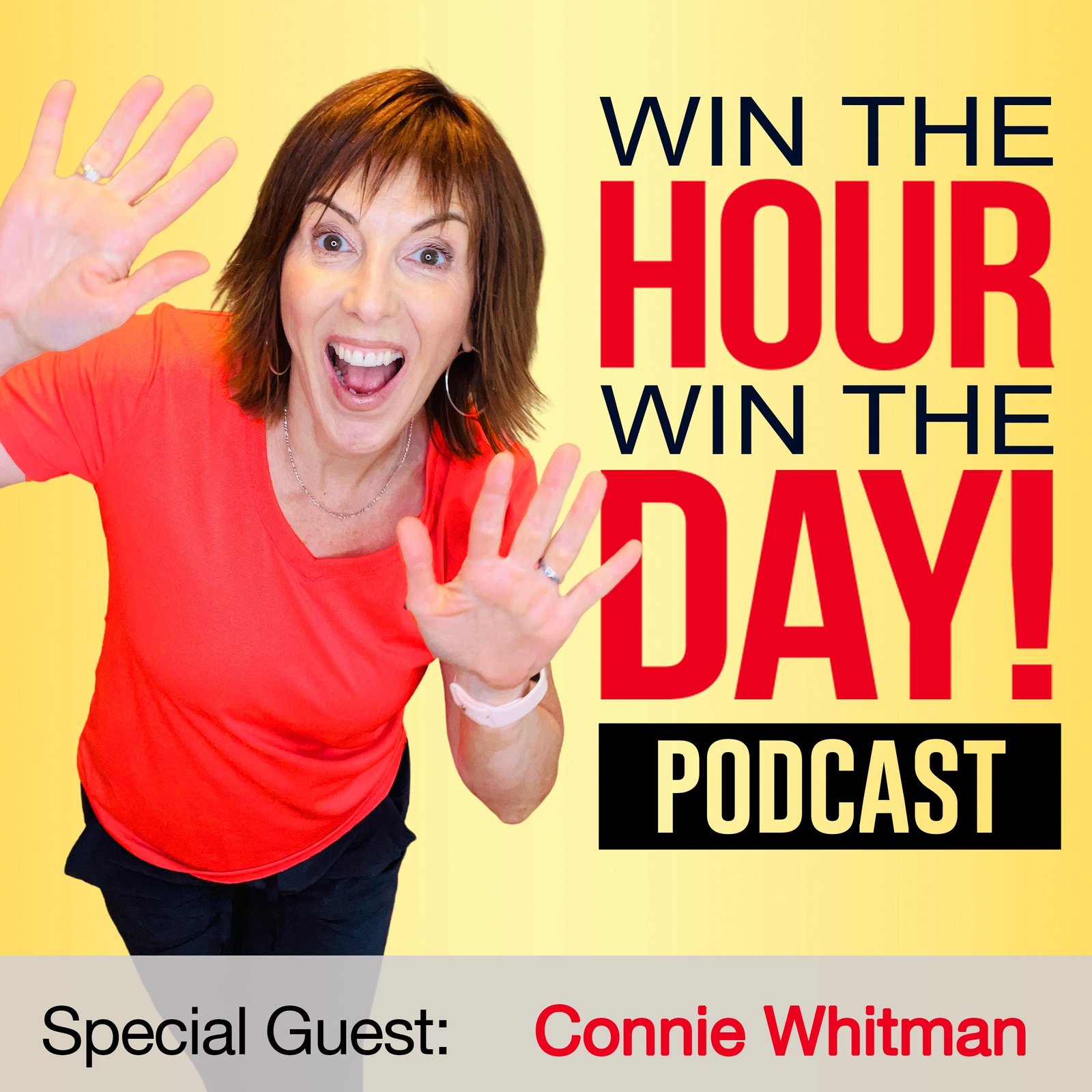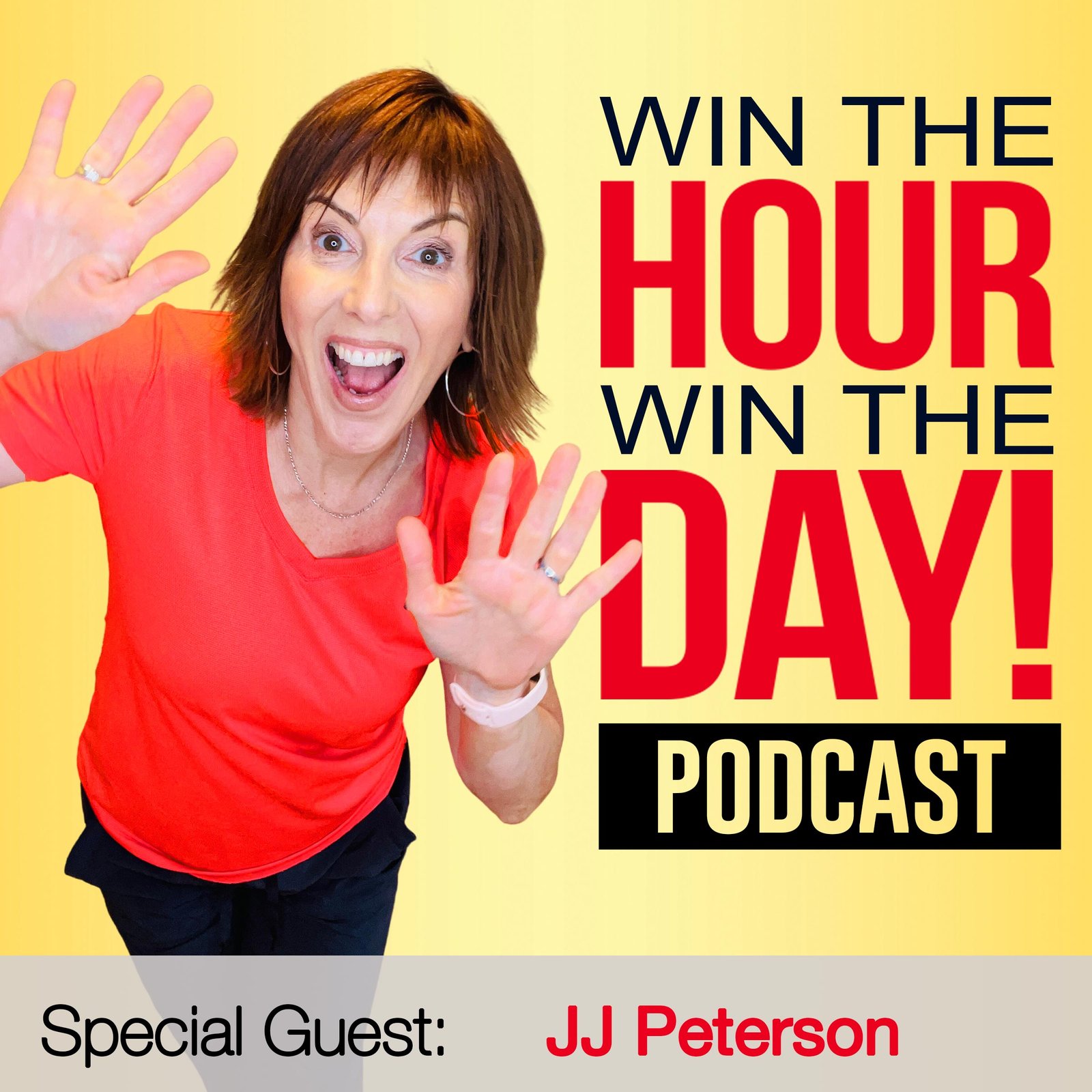Episode Summary This week’s episode of Win The Hour, Win The Day Podcast is...

Are You Ready For Your Next Big Win?
Know your entrepreneur personality and I’ll take it from there!
Recent Podcast Episodes
Preventing Burnout with Smart Work Tools! with Kris Ward
Episode Summary This week’s episode of Win The Hour, Win The Day Podcast is...
Master Social Selling: Heidi Medina’s Strategies for Engagement
Episode Summary This week’s episode of Win The Hour, Win The Day Podcast is...
Boost Productivity and Master Storytelling! with AmondaRose Igoe
Episode Summary This week’s episode of Win The Hour, Win The Day Podcast is...
Master Video Marketing: Top Tips for Entrepreneurs with Dan Bennett
Episode Summary This week’s episode of Win The Hour, Win The Day Podcast is...
Boost Your LinkedIn Strategy with AI Tools for Enhanced Productivity! with Joe Apfelbaum
Episode Summary This week’s episode of Win The Hour, Win The Day Podcast is...
Mastering Personal Branding with NLP Techniques! with Olesija Saue
Episode Summary This week’s episode of Win The Hour, Win The Day Podcast is...
Innovative Lead Generation and Email Automation Secrets with Jennie Wright
Episode Summary This week’s episode of Win The Hour, Win The Day Podcast is...
PR Strategies for Diverse Entrepreneurial Impact! with Jennifer Singh
Episode Summary This week’s episode of Win The Hour, Win The Day Podcast is...
Convert More Clients on LinkedIn with Richard Moore
Episode Summary This week’s episode of Win The Hour, Win The Day Podcast is...
Master Business Growth on Pinterest with Meagan Williamson
Episode Summary This week’s episode of Win The Hour, Win The Day Podcast is...
24/7 Sales Boost: Video Marketing Secrets with Alex Sheridan
Episode Summary This week’s episode of Win The Hour, Win The Day Podcast is...
Master Public Speaking Tips with Nausheen Chen!
Episode Summary This week’s episode of Win The Hour, Win The Day Podcast is...
Beating The Burnout With Connie Whitman’s Success Story
Episode Summary This week’s episode of Win The Hour, Win The Day Podcast interviews,...
Craft Your Social Media Content Strategy With Shannon McKinstrie
Episode Summary This week’s episode of Win The Hour, Win The Day Podcast is...
Boost Your Productivity with AI Tools: A Deep Dive with Erik Fisher
Episode Summary This week’s episode of Win The Hour, Win The Day Podcast is...
Boost Visibility: Repurpose Content and Leverage Podcasts With Christina Lenkowski
Episode Summary This week’s episode of Win The Hour, Win The Day Podcast is...
Master Personal Branding & Storytelling with Lisa McGuire
Episode Summary This week’s episode of Win The Hour, Win The Day Podcast is...
Boost Business on LinkedIn with Catherine B. Roy’s Strategies
Episode Summary This week’s episode of Win The Hour, Win The Day Podcast is...
Scale Your Business: Optimizing Virtual Assistant Services with Kris Ward & Rachel Eubanks
Episode Summary This week’s episode of Win The Hour, Win The Day Podcast is...
Affordable PR Mastery: Crystal Richard Unveils Modern Techniques
Episode Summary This week’s episode of Win The Hour, Win The Day Podcast is...
Mastering Business Storytelling with JJ Peterson’s Guide
Episode Summary This week’s episode of Win The Hour, Win The Day Podcast is...
Revamp Your About Page: Guide to Personal Branding
Episode Summary This week’s episode of Win The Hour, Win The Day Podcast is...
LinkedIn Mastery and Video Marketing Secrets with Alex Sheridan
Episode Summary This week’s episode of Win The Hour, Win The Day Podcast interviews,...
The Systems and Processes Playbook: Insider Secrets to Streamlining Your Small Business with Leah Abunales
Episode Summary This week’s episode of Win The Hour, Win The Day Podcast interviews,...
Distinguishing Options from Opportunities! with Diann Wingert
Episode Summary
This week’s episode of Win The Hour, Win The Day Podcast is sponsored by Win The Hour, Win The Day’s Signature Coaching Program the Winners Circle. Kris Ward who helps entrepreneurs to stop working so hard interviews, Diann Wingert.
What’s merely an option and a real opportunity in your business?
Tune in as Diann Wingert shares her insights on making smarter choices.
In this enlightening discussion, you’ll discover:
-The key differences between options and opportunities.
-Strategies to manage impulsivity and shiny object syndrome.
-How to effectively use a pause button and idea capture in decision-making.
Join us for a journey into making more intentional and impactful business decisions.
Don’t let this chance slip by to refine your entrepreneurial approach!
Power Personality Quiz
http://winbacktimequiz.com/
Win The Hour, Win The Day! www.winthehourwintheday.com
Podcast: Win The Hour, Win The Day Podcast
Facebook: https://www.facebook.com/winthehourwintheday/
LinkedIn: https://www.linkedin.com/company/win-the-hour-win-the-day-podcast
Win The Hour, Win The Day Winners Circle: https://winthehourwintheday.com/winners-circle-masterclass
You can find Diann Wingert at:
Podcast: https://podcasts.apple.com/us/podcast/the-driven-woman-entrepreneur/id1513039926
LinkedIn: https://www.linkedin.com/in/diannwingertcoaching/
Win The Hour Win The Day
https://winthehourwintheday.com
Diann Wingert Podcast Transcription
[00:00:00] Kris Ward: Hey everyone, welcome to another episode of Win the Hour, Win the Day and I am your host Kris Ward and today in the house we have Diann Wingert and Diann is a business strategist and coach for Ambitious Outliers. Welcome to the show, Diann.
[00:00:14] Diann Wingert: I’m so excited to join you today, Kris.
[00:00:17] Kris Ward: Okay. So Diann, we’re going to talk about the difference between options and opportunities and you know what?
[00:00:23] My gosh. I don’t think anyone talks about this and we should because this is the whole shiny object syndrome. Like when you think of the dog in the park, squirrel ball Oh, I’m over here. But now, I love let me back up and let me tell you four stories at once. Diann pay attention, take notes. Okay. So.
[00:00:41] Diann Wingert: I got my pen.
[00:00:42] Kris Ward: Okay. I work with entrepreneurs that, what we do is we scale their time and we do that through team time and toolkits and get them 25 hours back a week within the first month of working with us. And so I’m all about this. And what happens though is, even the best of the best you run around like you’re in grade three and you heard from the other kids in the park Oh my gosh, Oh, this is the new thing.
[00:01:10] Oh, we should all be here. We should all be doing this. Oh, now AI, whatever. And they’re just reacting and rushing and thinking that this, these are options, and something that, and no, these are opportunities. I’ll let you explain. They’re getting the two confused. And I think this I’m even confused in explaining it.
[00:01:27] So I think this is a really powerful conversation that we never shine light on. So where do we start?
[00:01:34] Diann Wingert: You did get it backwards, but I think most people do, Kris. And I think this is the problem. A lot of entrepreneurs have ADHD traits and one of the traits, and frankly, I say the only difference, not the only difference, the most important difference between a person with ADHD.
[00:01:52] And an entrepreneur is impairment. A lot of entrepreneurs have shiny object syndrome. So they say, do I have ADHD? Maybe it doesn’t matter, but what does matter is that you need to understand there is a difference between an option and an opportunity. Because if you have shiny object syndrome, if you see every buddy following, let’s say AI, or it could be anything. There’s always going to be something new coming down the pipeline. And if you’re the kind of person who’s got your hand up in the air, I call it the default. Yes. If it’s new, if it’s novel, if it’s shiny. You immediately want in. You immediately think it is much more important, crucial, necessary.
[00:02:37] You gotta have it. So you’re labeling it a can’t miss opportunity. And this could be anything from a new social platform, a new piece of technology, a new group, it could be anything, but in truth, we cannot afford to grab a hold and run with every new thing. Most of the time, we’re going to be slowing ourselves down, overcomplicating our business, and actually holding ourselves back. So the distinction is really important.
[00:03:09] Kris Ward: Yeah. And so I agree so much on so many levels because I think I was on an interview once and somebody asked me like, Oh, do you think all entrepreneurs have ADHD? And I’m like, okay, I’m not a doctor, but I will say we talk about that in our personality quiz. We call it, there are so many entrepreneurs think they have ADHD.
[00:03:27] And what I would say is whether you have it or not, running your own business will make you think you have it or you act like you have it. Cause there’s just so much going on at the same time, especially when it’s new. And in our personality quiz, we call that focusitis. And so that’s, really take our quiz.
[00:03:42] It takes 30 seconds and gives you immediate takeaways. If you’ve got focusitis or you’re rushaholic or whatever. So I think what you’re talking about there though, is the fear based mentality too. When you’re an entrepreneur and you tend to be isolated, especially when you don’t have a team or you’re running your team in a traditional way where you’re more like the parent and the supervisor, you still have a sense of isolation because you don’t actually have a team.
[00:04:07] You’re parentified because you’re using the corporate model. So it’s fear based and then you think, oh, okay, oh my gosh, I’m the one missing out and this is a new platform we should be on. And you’re rushing off and boy, oh boy. It’s to me, it’s a rookie mistake. And I, we certainly, I did that in my early slash column dark years, but now I see the real Oh, the real beauty, the real power, the real consistency to following through and understanding like, ah, just because let’s say it is a great opportunity doesn’t mean it’s opportunity for me.
[00:04:43] Diann Wingert: Exactly. And I think you’re absolutely right. And whether it’s a rookie mistake or whether it’s a mistake that even seasoned business owners make, in reality, I don’t care how energetic you are. You and I are both very high energy people, and that can sometimes mislead us into thinking our bandwidth is unlimited.
[00:05:05] First of all, most of the time, things that appear to be working for other people are not working as well as you think, but even if they are, it might not be for you.
[00:05:15] So I think it’s extremely important for us to one accept the fact that our bandwidth is not as expansive as we think. Put boundaries around the amount of time we allow ourselves to devote to our business on any given day or week, and even the amount of time we allow ourselves to sit in a focused state working on our business.
[00:05:39] Because it’s like the opposite of of multitasking. You and I have talked about that. Everybody thinks they need to multitask because they want to get everything done. The truth is you don’t need to get everything done. And the more things you’re trying to do, the less you’re doing a great job of any of them.
[00:05:56] So I believe that we need to have a filter for new things.
[00:06:02] Kris Ward: Oh, let me jump in here. I have to, because you said so many. Yeah. I call multitasking doing two things at the same time poorly, right? And then I think the analogy that comes to my mind always, it’s like taking a glass of water and you could have a sip of that.
[00:06:15] You could water a plant, you could dab it and clean something with it. You could do a lot with that glass of water, but you can do very little when you spill it over. And that’s where our energy goes, I’m all about that. And people confuse my high energy with being all over the place.
[00:06:30] And I’m just so not, and in fact, one of the things that we talk about when we talk about team mentality, and it’s so important to have a culture, right? It’s very different when you’ve got one or two people on your team, people confuse culture with larger teams, 50, 60 people, but you need to have a really effective culture when you have one or two people, which again, I talk about, it’s not the parentified system that we’ve most, all of us have worked under in the corporate world.
[00:06:57] And what happens though, when you have a really effective team, to your point, Diann is then you will, the way we work with our clients in the Winner’s Circle, you will at least hear yourself sounding foolish when you have to present this idea to your team.
[00:07:10] Okay, oh my gosh, I read this book on the weekend and now we’re going to do it this way. And then they look confused and scared and say, so we’re not doing, we’re not, are we not finishing that project or abandoning or what, where, you know, so then you can’t do that in your own head because you have to articulate why this is the newest new idea.
[00:07:30] And you then realize how foolish you sound. So it is so easy to get caught up in the hype, but it just doesn’t work.
[00:07:38] Diann Wingert: It not only doesn’t work. Impulsivity generally leads to regret, even if it turns out to be a good choice. For example, you might decide to jump on whatever the latest bandwagon is for many people right now.
[00:07:51] It’s generative AI like chat GPT. It may not be the right thing for you. It is an option. You do not have to check all the boxes. If it’s an opportunity, what makes something an opportunity is if it fits with your company culture, if it fits with your personal and business values, if it fits with your current 90 day plan and your goals, if you have the energetic capacity for it and you have the capacity for it with your business model and size of your team.
[00:08:28] And if you’re already practicing intentional constraint with time, effort, and dollars, that really will filter out like 99 percent of the shiny objects. I have a very structured strategic grid. And I think it’s important to know that every new shiny thing has to pass through and my team knows this.
[00:08:51] I’ve also been extremely strategic about my hires. I have one person on the team who’s like me. She loves every shiny object. If it’s new, if it’s novel, if it’s unsullied by experience. She loves it as much as I do, but as because so she’s always up for something new, which I love. However, I balance her by another team member who used to be an accountant.
[00:09:17] Oh boy, she is. She is precise. She is detail oriented and she has been empowered with the reminding me of what we’ve already committed to.
[00:09:32] Kris Ward: Yeah.
[00:09:33] Diann Wingert: So she’ll say Diann sounds like a great idea. Let’s put it in the idea parking lot for later.
[00:09:39] Kris Ward: Yeah. That’s a good one. We have an idea bank, but I like the idea parking lot.
[00:09:44] Diann Wingert: Yeah. Here’s the thing. If you are a person who is at this current moment, struggling to know the difference between an option and an opportunity, because you tend towards the impulsive when you see something new or that other people do it, you’re getting some FOMO. It just feels like a must.
[00:10:04] So if you don’t want to take the time to go through the filters that I’ve just described, your values, your goals, your bandwidth, and what’s going on currently with your team, money, dollars, effort, then if you don’t feel like you have time for that .This is what I do. I pitch it to my team. I will often do a quick little loom video one to three minutes and I’ll say, Hey, guys, I just thought of this most exciting thing.
[00:10:33] I just have to share it with you. What do you think? It gives me the opportunity to experience that joy. That dopamine hit that spontaneity. I don’t want to spoil that for myself. I don’t want to be, I don’t want to extinguish that part of myself. That’s curious. That’s fun. That’s spontaneous. That loves a new idea.
[00:11:00] So I will not stop doing that, but I limit it. I do my little video. I share it with the team. They look at it. They’ll say, wow, that’s really great, Diann. One of them will say, are we fitting this into our 90 day plan? And the other one will say, where does it fit with our current priorities, but first they tell them, they tell me it’s a great idea.
[00:11:24] I get my dopamine and then most of the time I’m like, yeah, it actually doesn’t fit with our current priorities. Let’s put it in the parking lot or it’s a catch and release. That’s what I..
[00:11:37] Kris Ward: Catch and release. Love that. Okay. So
[00:11:38] Diann Wingert: great idea. We’re not doing.
[00:11:40] Kris Ward: Yeah. So I love the catch and release. Okay. This reminds me of that saying where don’t judge, if you see somebody online or wherever in life doing something and you think you’re judging their chapter seven with your chapter two, like you don’t know where they are, how long they’ve been working on that. And so that’s a great reminder. I would also argue that it’s almost like you’re reading a different book.
[00:12:01] So if you hear on a podcast, Oh my God, CGI is if this is it, you got blah, blah, blah, blah. But now realize you’re listening to a podcast of computer techs, or this is their whole foundation. And so this is, it’s like somebody who’s a chef telling you about a new trick they learned.
[00:12:17] You know what, 10 years in the kitchen, this little tip means a lot to you, not so much to me. So it’s also make sure that you, when you’re chasing this new ambition or new knowledge, like that’s somebody else’s knowledge based on where they are in their journey and they may be in a completely different part of the woods than you are.
[00:12:37] So I think that’s really important. And to your other point, I think is very powerful. One of the things we always talk about with my clients and those in the Winner’s Circle is 90 percent of people use their calendar wrong. And that’s just that they don’t know how to plan their time, their energy, nothing.
[00:12:55] They just put outside appointments on there. They have no idea how long anything takes them to do. They’re running off a to do list, which is a percolating list of emergencies. And then that allows you the foolish freedom to think you have the bandwidth to do these things. So I also think when you have your business set out strategically, and it really is a business, it’s not being self employed or a self repreneur and you’re reacting all the time, that also cushions some of these things.
[00:13:20] So you do get to see really quickly, is this an option or opportunity?
[00:13:25] Diann Wingert: You have a grid, you have an algorithm, you have filters, just like I do. And if it doesn’t fit, it’s if it doesn’t fit, it has to go, but I think for me, the distinction is I enjoy those little squirts of dopamine and I’m not going to deny myself that, but I’m also no longer going to let myself go running off with something because what happens when you don’t have some sort of system, you may use Kris’s system, you may use my system, but if you’re not doing some sort of filtering.
[00:13:57] You’re just being impulsive and you’re running with something. What tends to happen next is that we develop sunk cost fallacy. It’s I’m doing this thing. So now I need to make it work. I need to double down. I need to see it through because otherwise we have feel the embarrassment or shame of being impulsive.
[00:14:15] It’s I accept how I am. That’s why I’ve built a framework to prevent me from getting too far afield with something I probably shouldn’t be doing, at least not now.
[00:14:26] Kris Ward: I think there is great power in that word, though, option, because it is an option, but is it a financial benefit? Is it an opportunity? Is something that’s going to give us a return on our investment, right?
[00:14:39] And that takes the gruel out of trying to figure out, Oh, is this something I should do right now? And everybody else talks about wait, what’s your 90 day or plan your quarter. And then that all sounds very heavy and restricting. And I think that and then, so then you come in with this false bravado, but I..
[00:14:55] That’s why I started my business, to have freedom of choices and stuff, but that’s fine. You didn’t start your business to have a hundred things incomplete and beat yourself up at night and think you just have to put in more hours. So I think there is great power in the way that you have articulated this.
[00:15:10] Is it an option? Is it an opportunity? And I think that’s very clarifying.
[00:15:15] Diann Wingert: I think a lot of people believe that anything they haven’t tried yet, is automatically an opportunity simply because they don’t recognize their own tendencies towards impulsivity, ADHD or not. But most people who’ve been in business for a while, you and I both work with established business owners.
[00:15:37] One of the things that I don’t think we take into account enough and should is boredom. I Remember a mentor telling me years ago. Diane, you have everything you need to be ridiculously successful, but you simply must learn how to manage boredom, specifically the boredom in our business. And I was mind blown at the time because I thought, how many times do we grab after something new? We label it an opportunity when it frankly isn’t simply because we’re feeling understimulated, feeling a little bored, feeling like our business is steady.
[00:16:18] Most business owners would love to have their business feeling steady. Love it. Crave it. Strive for it. Yeah, but there are others of us who treat boredom like a life threatening condition, and if that’s you are susceptible, chasing after things and calling them opportunities, and then justifying them because you don’t want to admit that you’re wasting your time, or you’re just trying to treat your boredom by overcomplicating your business.
[00:16:49] But one of the other things I teach is radical self acceptance. So you’re impulsive. So you have shiny object syndrome. So you don’t currently know the difference between an option and an opportunity. It’s not a character flaw. It’s just part of your makeup. So work with it and put some framework into place to prevent yourself from wasting time, energy, and dollars. It’s that simple.
[00:17:15] Kris Ward: Yeah, and I know we talk about this when we get our clients, like as they tell me all the time, they get 25 hours back a week within the first month of working with us. And then what happens though is I know I did this in, again, I refer to as the dark years where you’re so used to going so fast.
[00:17:31] Like I always thought I could out rush outrun time, like just go faster and faster. And then when I changed everything around and was much more strategic, I learned how to use my calendar, and I had our super toolkits in play. And it wasn’t that boredom, but sometimes if you’re doing something where you’re like, Oh, I can’t finish this, or this is difficult, or I’m at a pain point of writing this copy or figuring out what to do with this project, you go hop over and check an email for Oh, I’ll take a break.
[00:17:57] I’ll go do that. But that’s just a distraction and diversion. And we, and I think also too, from those early years when you’re getting the business up and running and it’s understandable where you’re trying to do a lot of things at the same time, then you think later, Oh, a lot of my clients will say, Oh my gosh I feel like I’m not doing anything if I’m not going three times the speed of light.
[00:18:18] And so you think it’s expectation of this term hustle. And if the fur isn’t flying and you’re not using all your limbs at the same time, then you’re not working hard enough. And so you set up these false opportunities thinking that it’s, busy work means things are happening. It, things must be happening. I’m so busy.
[00:18:37] Diann Wingert: This is so true and such a great point, because I think most of us who decide to become self employed. Yeah. We like to be busy, but being busy just to escape boredom is not success. As a matter of fact, it’s a fast track to burnout. Yeah. Yeah. Yeah. Of my clients, when they create more spaciousness in their calendar, they’ll say, Diann, I got to be honest.
[00:19:07] I know this is what we were working towards, but now that I look at all this white space, it’s creating anxiety. Great. Let’s talk about that because the truth is when you are at that point, even if it’s making you sick and miserable, you have calibrated your nervous system to chronic overwhelm stress, cortisol, high levels of adrenaline, not healthy, but really addictive.
[00:19:36] So you give people their time back. Once they have that time, they need to learn how to dial down their physiology and stop being terrorized by empty spots on their calendar, which is a whole other side of the equation.
[00:19:53] Kris Ward: Yeah. So powerful. So powerful. Okay. We’ve got a couple minutes left. What are some other aspects to this that you feel people often misunderstand or overlook?
[00:20:04] Diann Wingert: I think the most important part about this and something that I think is a really good, quick, easily implementable strategy is If you are a person who tends to see and do quickly, you bypass the filter of does it fit? Is it time? Do I need it? You just go right into action. You owe it to yourself to install a pause button and an idea capture.
[00:20:29] So if you’re on the go, for example, when I get ideas, usually when I’m in motion, when I’m on the Peloton bike, when I’m running, when I’m walking the dogs. So if you are the kind of person who gets an idea. And wants to do something immediately. And you’re also worried that the idea will evaporate if you don’t do it immediately.
[00:20:47] Kris Ward: As it does. Because if you don’t write it down, what I used to find back in the day was like, I think I’d have this great idea. And then I realized, no, I had that idea three months ago. I just didn’t implement it. So you’re right.
[00:20:57] Diann Wingert: Yeah. Not only that, I always say, because I work with people who have big ideas and busy brains.
[00:21:03] I didn’t. To act on a lot of good ideas because I thought, Oh, there’ll be another one and I’ll get another, there’s way more where that came from. So it’s both useful to have the pause button and to have the idea capture strategies together. If you don’t act on great ideas because you won’t remember them later, or if you have a tendency to jump on them because you’re afraid you won’t remember them later. So the easiest way.
[00:21:30] Kris Ward: that’s a good point. Very good.
[00:21:31] Diann Wingert: Yeah. Especially if you have ADHD, because usually memory issues are part of it. So that’s where some of the impulsivity comes in. It’s not necessarily that you want to act on something immediately. You’re afraid if you don’t act on it immediately, you’re going to forget.
[00:21:45] But I say now, if it’s that stellar of an idea, if it’s that epic of strategy that your business simply can’t be successful without. Do you really think you’re going to forget it? Because if so, it probably is just an option. So the easiest way to do an idea capture is to use the voice memo function on your phone.
[00:22:08] Or if you don’t like talking to yourself, I happen to like talking to myself. You can just send yourself a quick text. That way you can let your mind be at ease. Because you’ve captured it. I think about it as catching fireflies within that you grab that idea. You’ve now given it a place to land where it won’t be forgotten or lost.
[00:22:32] So you don’t have any anxiety around it. That right there will bring down the tension in your brain, so that you can evaluate that thing more objectively. So that’s the idea of CAPTURE. Lots of ways to do it. That happens to be my favorite way. And the PAUSE button. Okay, this is especially helpful when the option versus opportunity dilemma comes up with people inviting you to do things.
[00:23:01] It could be someone sends you a text, sends you a voxer message, sends you an email, bumps into you at a conference and says, Oh, Diann Wingert, just the person I’ve been looking for. Of course, they wouldn’t say that to you, Kris, but and then they say, Oh, I would love to invite you to x, y, z, and Most people like me have a default.
[00:23:24] Yes. They immediately say yes to everything because it makes the other person happy. You don’t have to justify why you’re not saying yes. It’s quick. It’s easy, but you’re not taking anything into consideration. Is this an option or an opportunity? Do I have the bandwidth? Is this an alignment with my current goals, my values, my bandwidth?
[00:23:47] So when you say yes to everything, You’re gonna have problems. So I’ve installed a pause button. Okay. And this is how it goes. I have a rule now, Kris, I never say yes to anything on the spot because I know if I do, it will be largely impulsive and largely with that whole people pleasing. I have to run it through my framework, which means I have to be able to step away from that email or that person at the conference.
[00:24:19] So I have little phrases that I have memorized like a mantra and I’ll say, that sounds like an exciting opportunity. I need to run it by my team to make sure it fits with our current priorities and goals. Can I get back to you in right now? If it’s face to face, I had to memorize things. Now it’s a little bit easier for me because I’ve done this many times, but on the spot.
[00:24:50] Hitting the pause button means basically being non committal. I’m not saying no, but I’m not saying yes. I’m saying not right now, I’ll get back to you. But then I have to do an idea capture so I don’t forget to get back to them.
[00:25:06] Kris Ward: Yeah. We, I have a little idea bank and you can have them like if you got an iPhone, you just put it in notes or I use Notion and it’s like a little app.
[00:25:13] It’s so cool. But I think that’s really a good point is I learned that back in the early years of not giving a price. Somebody asked you on the spot what does it cost? And you throw a price at them and they don’t understand. You’re like, why did I do that? I knew, but they asked me and what am I in grade two?
[00:25:27] I had to be obedient answer. So I think that’s a very powerful point and a great one to end on is yeah, okay. That does sound like opportunity because you don’t want to be five minutes ago. Oh, why did I do that? I already said yes to so and so it’s the same thing. And and then it’s just so messy and complicated to get out of.
[00:25:42] So I think that’s a really Powerful point. Diann, where can people find more of your brilliance?
[00:25:49] Diann Wingert: I like to say, if you like the sound of my voice and what I have to say with it, you should check out my podcast, the Driven Woman Entrepreneur. And for the record, you do not have to be a woman and you do not have to be an entrepreneur to listen.
[00:26:02] I think you might like it regardless. And you can also follow me on LinkedIn at Diann Wingert Coaching.
[00:26:08] Kris Ward: Excellent. All right. Everyone else. Don’t forget to share this with a business buddy. They’ll thank you. Business friends do not let business friends suffer. So share this podcast and we will see you in the next episode. Thank you so much..





